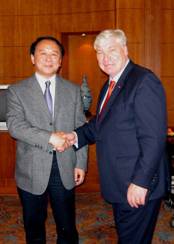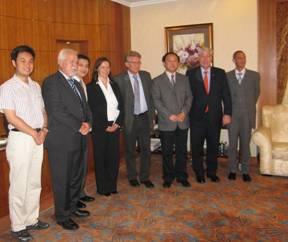On August 24, 2009, at the invitation of the German Trade Union Confederation and the Friedrich Ebert Foundation of Germany, Li Deqi, President of China University of Labor Relations (CULR), Qiao Jian, Director of the School of Labor Relations and Human Resources, and Dr. Wang Kan from the School of Labor Relations and Human Resources met with a delegation from the German Trade Union Confederation (DGB). The delegation was led by Michael Sommer, Chairman of the DGB, and consisted of four members including Wolfgang Lutterbach, Director of the International Trade Union Policy Department of DGB.
During the meeting, both sides had in-depth discussions on the issues of Chinese migrant workers and future cooperation. At the suggestion of the German side, President Li Deqi and Associate Professor Qiao Jian shared their views on the historical background, current situation, and union work related to Chinese migrant workers, respectively. President Li Deqi pointed out that migrant workers are an inevitable product in China's process of marketization, industrialization, and urbanization, and also an issue related to population mobility and sustainable population security in the transition from social management to social governance by the Chinese government. At present, with the second generation of migrant workers gradually becoming an important new force in China's working class, their contribution to social and economic development, as well as their awareness of rights and organizational consciousness, have been enhanced, posing new requirements for China's social and economic policies, labor legislation, and the establishment and rights protection work of Chinese trade unions. In recent years, the Chinese government and trade unions have made positive progress in promoting the protection of the rights and interests of migrant workers, especially in adopting and implementing a series of effective policy measures in response to the international financial crisis.
Director Qiao Jian stated that since 2004, the Chinese government has increased the institutional and legal protection for the rights of migrant workers. Chinese trade unions gave top priority to safeguarding the rights and interests of migrant workers. As of now, more than 72 million migrant workers have joined trade unions. The trade unions also provided cross-regional legal services to protect the legitimate interests of migrant workers in the process of mobility. In addition, Chinese trade unions are also strengthening the labor contract and collective contract system to safeguard the legitimate rights and interests of migrant workers through coordinating labor relations.
During the meeting, the German side raised the issue of social security for migrant workers. Both President Li Deqi and Director Qiao Jian held that social security and related legislation are areas that urgently need improvement. At present, issues including the continuity of social security for migrant workers have become important problems that must be solved in establishing harmonious labor relations. Chinese trade unions should and can play a greater role in helping migrant workers integrate into cities and obtain better basic security in this regard.
Mr. Sommer, Chairman of the DGB, stated that they benefitted a lot from the meeting with experts from the CULR. In the process of globalization and European integration, German trade unions also face challenges in protecting the rights and interests of migrant workers. The exchange with Chinese researchers this time has broadened the perspective of German trade unions. The DGB hopes to explore cooperation opportunities with the CULR on relevant research and exchange matters in the future.
The delegation from the DGB visited the CULR at the invitation of the All-China Federation of Trade Unions for friendly exchanges. Mr. Sven Schwersensky, Director of the Friedrich Ebert Foundation's Representative Office in China and Mongolia, attended the meeting.
(Foreign Affairs Office, School of Labor Relations and Human Resources)


